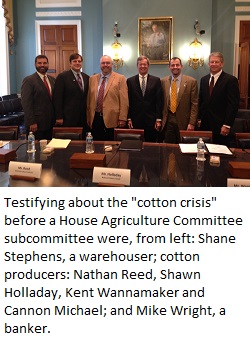 The U.S. cotton industry faces some tough economic conditions right now, and leaders from the sector were on Capitol Hill to let lawmakers know how they could help. This news release from the National Cotton Council says the group outlined numerous market, policy and regulatory issues that threaten to undermine the U.S. cotton industry’s health during testimony before the House Agriculture Committee’s General Farm Commodities and Risk Management Subcommittee.
The U.S. cotton industry faces some tough economic conditions right now, and leaders from the sector were on Capitol Hill to let lawmakers know how they could help. This news release from the National Cotton Council says the group outlined numerous market, policy and regulatory issues that threaten to undermine the U.S. cotton industry’s health during testimony before the House Agriculture Committee’s General Farm Commodities and Risk Management Subcommittee.
The hearing panel was comprised of National Cotton Council (NCC) Vice Chairman Shane Stephens, a Greenwood, Miss., warehouser; a group of four cotton producers: Nathan Reed, Arkansas state chairman, American Cotton Producers, Marianna, Ark.; Shawn Holladay, a NCC director from Lubbock, TX; Kent Wannamaker, president, Southern Cotton Growers, Saint Matthews, S.C.; and Cannon Michael, a NCC director from Los Banos, Calif.; and Mike Wright, a Lubbock banker.
Vice Chairman Stephens stressed that a thriving cotton industry is critical to the success of many local economies.
“With the lowest U.S. cotton acreage in more than 30 years, the smallest exports in 15 years, and cotton prices at their lowest level since the 2009 recession, economic pressure is mounting,” Stephens said. “Cotton demand, 10 percent below the peak observed in 2006, is struggling due to increased competition from synthetic fibers, and government support for international cotton production is increasing. To help address the current economic climate, the cotton industry is urging the designation of cottonseed as an ‘other oilseed’ for the purpose of participation in the farm safety net.”
Each of the producer panelists testified to the need for the Agriculture Secretary to designate cottonseed as an ‘other oilseed’ and be eligible for the Agricultural Risk Coverage and Price Loss Coverage programs. They stated providing a safety net for cottonseed “is desperately needed to provide stability in the cotton industry.”
The witnesses told legislators that if more stabilizing policies aren’t implemented very soon, cotton acres will continue to drop to the point where the infrastructure won’t survive.
